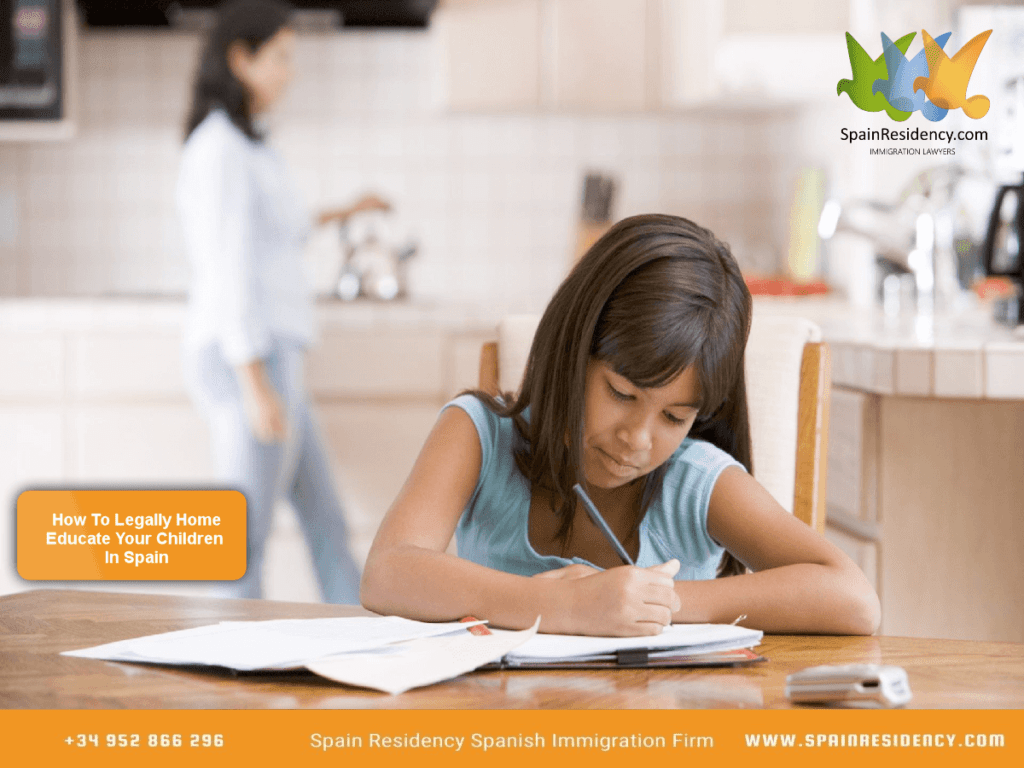Homeschooling, or home education, is an increasingly popular choice worldwide, including in Spain and with international people who obtain residency in Spain, which is why we explain here how to legally home educate your children in Spain. While traditional education in public or private schools remains the norm in Spain, more and more parents are considering homeschooling as a viable and effective alternative.
Menu:
In this post we cover the following: (click any section to see its content)
How to legally educate your children in Spain:
If you’re thinking about educating your children at home as a resident of Spain, this article will provide you with useful information about how to legally homes educate your children in Spain.
HOMESCHOOLING IN SPAIN:
Homeschooling, also known as home education, is an educational approach in which parents or guardians take primary responsibility for their children’s education instead of sending them to school. In homeschooling, parents are responsible for teaching and guiding their children through the curriculum and educational materials.
Homeschooling has become increasingly popular in recent years, especially for international parents who obtain Residency in Spain, and there are various reasons why parents choose to educate their children at home. Some parents opt for homeschooling because they want more control over the educational content and values conveyed to their children. Others do so due to safety concerns in schools or to accommodate their children’s special learning needs.
In this new educational model, parents can design a customized curriculum for their children, allowing them to tailor education to each child’s needs and abilities. Furthermore, homeschooling offers greater flexibility in terms of schedules and calendars, which can be beneficial for families with busy schedules or for those who are frequent travellers.
However, it’s important to note that homeschooling also presents significant challenges. It’s crucial to understand that homeschooling is not suitable for all families, and may require a significant commitment of time and resources, especially
RETURN TO MENU »
PROS AND CONS OF HOMESCHOOLLING IN SPAIN:
Before deciding if homeschooling is right for your family, it’s important to understand the pros and cons of this form of education.
Some benefits of homeschooling include:
- Greater flexibility regarding schedule and pace of learning.
- Customization of education according to each child’s needs and interests.
- Increased parental involvement in the educational process.
- Less exposure to negative influences in the school environment.
However, homeschooling also has some disadvantages, such as:
- Greater workload for parents, who must design and implement the curriculum.
- Less social interaction for children, potentially missing out on the school experience and relationships with other children.
- Fewer educational resources and materials, especially compared to a well-equipped school.
LEGAL REQUIREMENTS FOR HOMWSCHOOLING IN SPAIN:
Legal requirements for Homeschooling in Spain
If you obtain residency in Spain, through any of the types of residency in Spain, the Non-Lucrative visa in Spain, the Digital-Nomad visa in Spain, the Self-Employed visa in Spain or the Golden-Visa in Spain, and decide to educate your children at home in Spain, it’s important to comply with legal requirements to avoid issues with educational authorities. This means that parents who want to homeschool their children must meet specific legal requirements to avoid possible penalties.
Firstly, parents must submit a declaration of home education to the relevant educational authority. This declaration should include information about the names and ages of the children who will receive home education, as well as a detailed description of the curriculum to be followed.
Regarding the curriculum, parents must follow the same guidelines as conventional schools regarding knowledge areas and the expected level of education for students. Parents must also ensure that their children have access to age-appropriate and level-appropriate educational resources and materials.
Lastly, parents educating their children at home must allow educational authorities to conduct regular inspections and evaluations to ensure legal requirements are being met and that the children are receiving adequate education.
In summary, parents who wish to homeschool their children can do so as long as they comply with the legal requirements set by educational authorities. It’s important to note that these requirements may vary from one region to another, so it’s essential to stay informed and follow the specific guidelines of the local educational authority.
RETURN TO MENU »
USEFUL LEGAL TIPS:
If you decide to educate your children at home in Spain, it’s important to start off on the right foot to ensure success. Some useful tips to successfully begin homeschooling include:
Thoroughly research and plan your educational approach, including the resources and materials you’ll need.
Establish clear schedules and routines to ensure steady progress and avoid chaos.
Seek online and local homeschooling communities for resources and support.
Ensure your children have opportunities to interact socially with other children, for example, through extracurricular activities or organized playgroups.
Homeschooling FAQs
- Is homeschooling legal in Spain?
Homeschooling in Spain is currently in a legal grey area, meaning there is no specific legislation. According to the Constitution, it is legal, but according to the Education Law, it is not. However, there is increasing jurisprudence in favor of this practice, leading to the formation of parent associations advocating for its legality. - Do I need to have teaching qualifications to homeschool in Spain?
It’s not necessary to have teaching qualifications to educate your children at home in Spain, but it’s recommended to undergo training and prepare for this important task. - Can I use online educational resources for homeschooling?
Yes, online educational resources can be a valuable tool for homeschooling in Spain. However, it’s important to carefully select resources and ensure they meet the educational requirements of your community.
CONCLUSION OF HOMESCHOOLING IN SPAIN:
Homeschooling can be an effective and rewarding option for families who want to educate their children at home in Spain. However, it’s important for parents to understand the pros and cons of this form of education, comply with legal requirements, and adequately prepare for the task of homeschooling their children.
With proper planning, resources, and support, homeschooling in Spain can be an enriching experience for the entire family.
RETURN TO MENU »
ALL TYPES OF RESIDENCY AVAILABLE IN SPAIN:
- Golden-Visa Spain (Spain citizenship by investment)
- Non-Lucrative visa Spain (Spain visa non lucrative)
- Self-Employed visa Spain (self employed expats in Spain)
- Digital-Nomad visa Spain (remote worker in Spain)
Please see-here our video-blog with options and legal-advice to obtain residency in Spain.
HOW TO LEGALLY HOME-EDUCATE YOUR CHILDREN IN SPAIN:
Do you need legal assistance in Spain?
We are a Spanish Solicitor and assist our clients with all types of residency applications.
Permanent residency is obtained after 5 years of Spanish Residency through Self-Employed Residency, Digital-Nomad, Non-Lucrative Residency or Golden-Visa. This followed by 5 years as a permanent resident in Spain and means you can then obtain Spanish Citizenship with a Spanish Passport.




